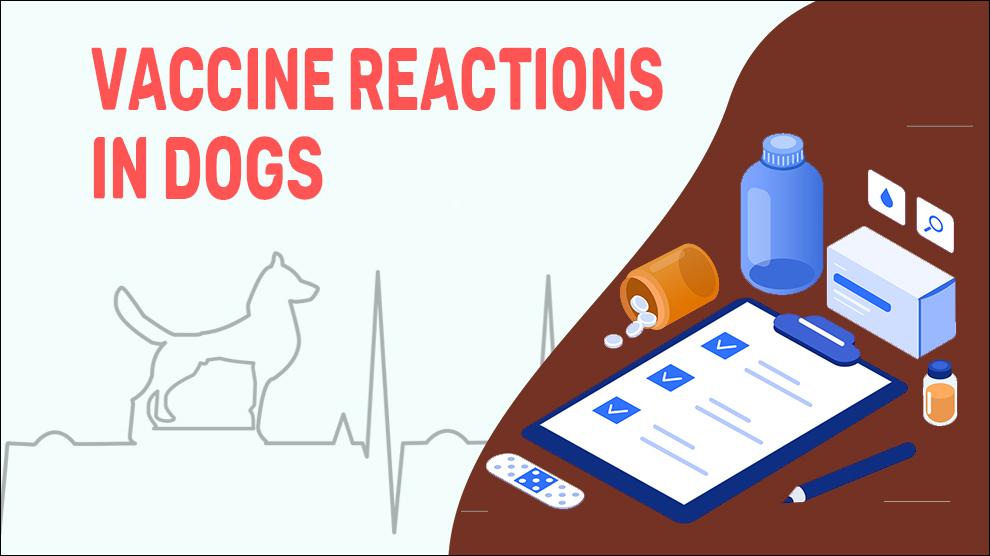What Is Vaccine Reactions In Dogs?
Most commonly, the merits of proper vaccination far outweigh the demerits. Although dog vaccine side effects are possible as it is often true in veterinary medicine. It is important to keep in mind that for the vast majority of dogs, there will be no significant adverse reaction but it will offer protection against potentially serious diseases.
Vaccine reactions in dogs can be worrying and frightening for you as a pet owner, but they will be less so if you know how to react and what to watch for?
Vaccinations don’t need the veterinarians to execute invasive procedures that need a high level of accuracy. Most of the time, Vaccinations are performed with no untoward incidents; however, the risk of adverse reactions when using a Vaccinations cannot be ignored. With few studies suggesting that the rate of Vaccinations death in pets is higher than humans; around 1 in 10000 animals experience some type of painful post Vaccination reactions.
In general, Almost 1 in 1 lakh dogs will have some type of fatal complications to vaccines. These effects may range from a lethargy and soreness, small swelling at the site of injection or to a full-scale, severe anaphylaxis or even death (rarest of the rare). Though, many vets point out that the risk of death due to vaccinations is relatively lesser than the risk of death due to infections.
Symptoms Of Vaccine Reactions In Dogs
Treatment Options For Vaccine Reactions In Dogs
When your dog exhibits allergic reaction symptoms under anesthesia, the specialist will perform intravenous administration of appropriate drugs.
Cetirizine, Loratadine, Benadryl, Loratadine or any other antihistamine can be administered for mild reactions.
Corticosteroids (cortisone or prednisone, prednisolone, or methylprednisolone) can also help to reduce inflammation and swelling, and make airways open.
Anaphylactic reactions (IgE-mediated type I hypersensitivity): Epinephrine, atropine and/or aminophylline.
Other security measures include emergency treatments to maintain heart function may be provided in severe situations.
Additional fluids and an IV catheter also may be required in the surgical procedures. This helps to restore lost fluids, and make sure that the vets can provide proper drugs efficiently.
Home Remedies For Vaccine Reactions In Dogs
- Never give several vaccines at once
- Always your pet vaccinated at a vaccine Clinic
- Provide all medication and administer environmental changes as recommended by your veterinarian
- Avoid medications that worsen symptoms of allergy
How To Prevent Vaccine Reactions In Dogs?
Complete physical tests and pre- vaccination exam may help to make out conditions that might lead to adverse reaction under vaccination, such as organ disease, infectious diseases or dehydration.
It’s critical to find out these disorders as they could result in complications. Chronic conditions, like heart problems or diabetes must also be declared lest they are not found in the pre-vaccination check-up.
Most of the chronic conditions can enhance the chances of vaccination allergic reaction being critical.
Previous allergy episodes, whether they were to medications, or a vaccine or even to pain medications should be mentioned.
Affected Dog Breeds Of Vaccine Reactions
Dachshund, Pug, Boston Terrier, Miniature Pinscher, Chihuahua, Maltese, Miniature Schnauzer, Jack Russell Terrier, Toy Poodle, Yorkshire Terrier
Causes And Prognosis For Vaccine Reactions In Dogs
1. Causes:
- Inappropriate monitoring / dosing
- No proper assessment of past medical conditions
- Older dogs/puppies are more prone to complications
- Brachycephalic breeds: During anesthesia, facial structure of these breeds can enhance the possibility of respiratory problems and airway obstruction
- Toy breeds – doses must be carefully calculated, even a small mistake will have more dire results
2. Mortality:
There is mortality associated with ‘vaccinations’, however, it is comparatively very rare.
3. Diagnosis:
- Complete blood count test (CBC)
- Complete physical exam
- X-rays and Ultrasound
- Electrocardiogram
- MRI or CT scan.
4. Prognosis:
The rate of vaccination allergy in dogs is rare, however, it does happen and in some cases it can be deadly. Implementation of proper precautions will decrease the risk of complications with vaccination.
When To See A Vet For Vaccine Reactions In Dogs?
- Swelling/redness at injection site
- Drop in pulse/ blood pressure
- Rashes/hives/itchy skin
- Sneezing and sniffling
Food Suggestions For Vaccine Reactions In Dogs
- Green vegetables : Cauliflower, cabbage, cantaloupe, brussel sprouts, spinach, Kale and silver beets
- Organ meat, Grass-Fed Meat, boiled chicken
- Vitamins: Broccoli, brussel sprouts, spinach, kale, papaya, strawberries and pineapple
- Chicken Soup bone broth (or use lamb/beef bones)
- Lean meats, Beef liver/Mutton Liver, raw egg yolk, canned sardines, salmon, pumpkin and green vegetables
Conclusion
Although the vaccination allergy is rare, it is better to get recommendations of a veterinary anesthesiologist. Check whether if they have any other neurological or metabolic problems before proceeding with vaccinations.

















